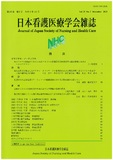Japanese
English
- 有料閲覧
- Abstract 文献概要
- 参考文献 Reference
抄 録
目的:健康教育や予防行動に有効であるヘルスリテラシー(以下;HL)に着目し、NAFLD 患者のセルフケア継続への支援を検討するため、セルフケアの継続ができているNAFLD 患者のHL を明らかにする ことである。
方法:A市1 か所のクリニックに通院している患者12 名に半構成的面接を行い、質的帰納的分析から、コード・サブカテゴリー・カテゴリーを抽出した。
結果:「セルフケアの継続ができているNAFLD 患者のHL」は、6カテゴリー【行動変容の意味づけができる能力】【情報を活用することに変化させることができる能力】【病状を理解するために関連づけるこ とができる能力】【健康行動の理解ができる能力】【効果的な活用の導入ができる能力】【活用における良くなることの面白味を見いだせる能力】、18サブカテゴリーであった。
結論:セルフケアの継続ができているNAFLD 患者のHLのカテゴリーは、「NAFLD 患者のHL に焦点 をあてたセルフケア支援」とすることで、NAFLD 患者が健康管理を行い、セルフケアの継続が期待できると示唆された。
Abstract
Purpose: Health literacy (HL) is effective health education that enables preventive behavior. This study surveyed non-alcoholic fatty liver disease (NAFLD) patients who were able to self-care, to identify HL among such patients.
Method: Semi-structured interviews were conducted with 12 NAFLD patients attending a clinic in City A who were able to self-care. From the interview data, codes, subcategories, and categories were extracted through qualitative inductive analysis.
Results: The “HL of NAFLD patients who are able to continue self-care” comprised 18 subcategories and the following 6 categories: ability to make sense of behavior change, ability to change information into use, ability to relate to understand the disease state, ability to understand health behavior, ability to introduce effective use, and ability to see the fun in getting better in utilization.
Conclusion: The results suggest that “support focused on HL for patients with NAFLD” can help them manage their health and continue self-care.
Copyright © 2023, Japan Society of Nursing and Health Care All rights reserved.


